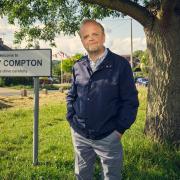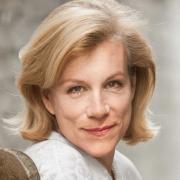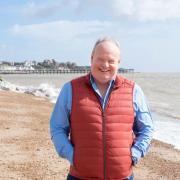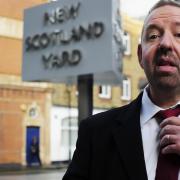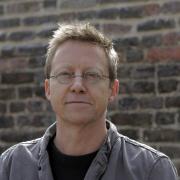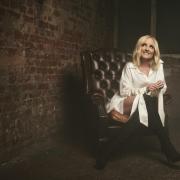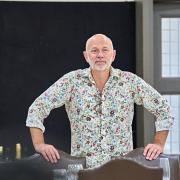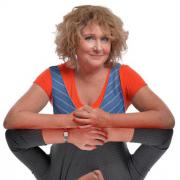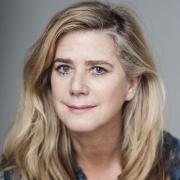From the relative calm of his Aldeburgh home, satirist Craig Brown maintains his prolific output of humour, parody, biography and social commentary that includes 30 years as a contributor to Private Eye
'You couldn’t make it up’ is a common refrain for these strange times we're living in. But satirists are engaged to do just that, exaggerating the truth to enlighten and entertain. These days their job seems in danger of becoming simply reporting the facts.
“It’s a particularly odd time,” says Craig Brown, one of our most respected and best-loved writers, biographers and satirists. “There hasn’t been so much to say because [real events] always outdo you. “It’ll pass. I think there’s always been this idea that politicians were better in the old days. People have a keen sense of nostalgia. One day people will be saying, ‘remember Liz Truss? Such a giant compared to the people we have now’.”
His deadpan delivery in words and speech has made him a highly successful creator of spoofs, parodies and ‘verbal caricatures’. He's contributed to Private Eye for more than 30 years and most of our national newspapers, at one time or another, with serious and not-so-serious articles and columns. He’s written comedy shows for TV and radio, been a restaurant and TV critic, and this summer he stepped down from the Mail on Sunday as its book critic after 23 years.

Informed, intelligent journalism, or lampoons, parodies, jokes and jibes? We need to keep on our toes when we're reading his articles, don’t we? “People should recognise when I’m telling jokes,” he says. “If they thought I wasn’t telling jokes, it wouldn’t be funny. It’s like watching a ventriloquist. Half of your brain is thinking this is actually a monkey talking. You’ve got to realise that it’s someone doing something clever.”
The past decade of his work have been collected in a new book called Haywire: the Best of Craig Brown. In it, the reader turns the page from quickfire gags - "Apple, banana, celery…he says to his walkie-talkie. He’s a smoothie" - to poignant observations of the pain and sadness of the comedian Kenneth Williams. There are silly household tips from Mary Berry (don’t eat an egg with the shell on) and thoughtful celebrations of the Marx Brothers and Les Dawson, plus parodies of Jacob Rees-Mogg and scholar Mary Beard.
He had 2 million words to choose from since his last book of journalism in 2010, he says. “It was luxurious to make the selection, getting the variety of articles and putting them in different categories. I took some care with it.” And there’s a salutary warning in the book’s foreword, as Craig acknowledges that the blurring of lines between fact and fiction can catch out the best of us.
“While I was compiling a quiz, I hit upon the idea of a section devoted to the names of famous characters in fiction. Did James Bond have a middle name?” Like everyone, he typed the question into Google and there were more than 2 million results with the answer James Herbert Bond. But when he was directed to the original source of the information, he found it was ‘Craig Brown’, who also claimed that Basildon Bond was the spy’s sibling, “a leading figure in the stationery business”.
“Somewhere along the way, a joke had been transformed into a fact,” he says. “Now like a prankster who balances a bucket of water on the top of a door and forgets it’s there, I had stepped into a trap of my own making. In the glare of the internet, the border has been blurred between true and false, authentic and concocted, nutcase and expert. On social media anyone can rule the world. Of course that makes my job easier. A world gone haywire has long been the satirist’s guiding star.”
However, he’ll be looking for accurate information with quirky, fascinating facts in his latest project, a book about Queen Elizabeth II. It follows on from the success of his other biographies of the Beatles, One Two Three Four, and of Princess Margaret, Ma’am Darling, where he describes his award-winning approach as a ‘patchwork’ or ‘mosaic’. He started his research at the beginning of the year. “Then suddenly all this stuff started coming in,” he says of the coverage during the mourning period before the funeral. “Every paper had about 30,000 words. It felt like a runaway train.”
The book won’t be published for a couple of years. He is exhaustive in his research and cataloguing of information before he allows his mind to wander along whatever trail it chooses. “It won’t be like other Queen books, which tend to be rather dogged and dull,” he says. “I’m more interested in the position she has in everyone’s psychology, people’s dreams, that kind of thing. But I still feel I have to take notes about everything.”

He works from an office on the ground floor of his tall Aldeburgh seafront home. Bookcases line the walls floor to ceiling, each case dedicated to a particular category of titles. There are piles of newspapers, boxes of Private Eye, stacks of books on the floor, and in the centre of the room a circular dark wood table covered with papers, books and his Apple Mac computer.
It's a few steps outside through the garden to the beach if he feels like a swim. "It can all be over and done with in ten minutes - you just decide to go, get in, get out.” But upstairs, making a cup of tea in the kitchen with its vast sliding window, the view of the sea is often a distraction. “It’s always different,” he says. “The light, the horizon, sometimes it’s terribly clear, sometimes it’s really rough. There are boats and seals – that’s always exciting. Sometimes the sky is much darker than the sea, or the sea is white, or blue, or green. Even on a boring day it’s not boring. It’s always on the move."

He’s lived in Suffolk for nearly 40 years and only rarely makes trips to London, and then for parties not offices. “For the Mail on Sunday I once went in to have my photograph taken for the picture byline. When I was on The Times I'm not sure I went in at all. And even Private Eye, which I'm sort of closest to, I maybe go in once a year.”
There’s little he misses living in Aldeburgh. The town has almost everything he needs, he says. “I do rather like walking up hills and that’s something you don’t get in Suffolk. I like the sense of achievement you get from the top of the hill.”
Haywire is published by Fourth Estate
Craig Brown recommends...
I’m currently re-reading the Collected Short Stories of John Cheever, and they are as good as I remember them, 20 years ago - elegant, wry and often profound.
And the Diaries of Samuel Pepys never grow stale - they show the hustle and bustle and scheming and flirting and gossip of city life as if they were written yesterday.
Discovery of the year, though rather belated, Claire Keegan, whose novella Small Things Like These was shortlisted for the Booker Prize. She’s as good as William Trevor, and that’s saying something.




